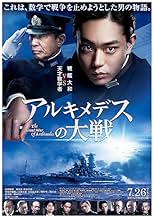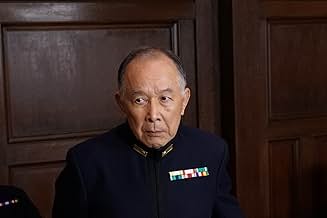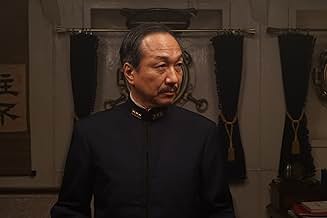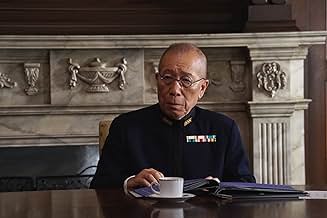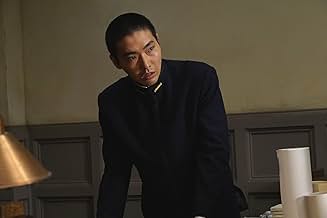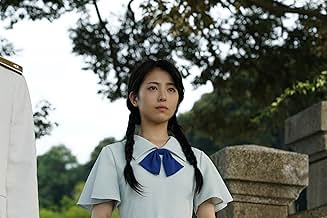IMDb-BEWERTUNG
6,7/10
1315
IHRE BEWERTUNG
1933 deckt ein junger Marineoffizier und Mathe-Wunderkind eine Verschwörung um den Bau japanischer Kriegsschiffe für den laufenden 2. Weltkrieg auf.1933 deckt ein junger Marineoffizier und Mathe-Wunderkind eine Verschwörung um den Bau japanischer Kriegsschiffe für den laufenden 2. Weltkrieg auf.1933 deckt ein junger Marineoffizier und Mathe-Wunderkind eine Verschwörung um den Bau japanischer Kriegsschiffe für den laufenden 2. Weltkrieg auf.
- Regie
- Drehbuch
- Hauptbesetzung
- Auszeichnungen
- 4 Nominierungen insgesamt
T.J. Anthony
- Osami Nagano
- (English version)
- (Synchronisation)
Luis Bermudez
- Mr. Osato
- (English version)
- (Synchronisation)
Jacob Eiseman
- Various Soldiers and Walla
- (English version)
- (Synchronisation)
Alex Hom
- Shojiro Tanaka
- (English version)
- (Synchronisation)
Chase Kloza
- Additional voices
- (English version)
- (Synchronisation)
Lizzy Laurenti
- Walla
- (Synchronisation)
Nicholas Markgraf
- Additional Voices
- (English version)
- (Synchronisation)
- …
Empfohlene Bewertungen
I found this movie to have an interesting mix of historical and fiction in the events portrayed. The CGI used in some sections is fairly good, but could have been better, which I assume is related to the production budget. The acting seems to be somewhat exaggerated in gesture and vocalization. There are some technical faults in the battle scene and in the sinking of the ship, but they do not detract from the imagery - only a 'purist' would point them out. The English dubbing takes some getting used to from the synchronicity of the face and words. Listening in Japanese and having English subtitles is easier to watch.
"The Great War of Archimedes" (2019) offers a captivating journey into naval politics and wartime calculations. Though visually impressive, the film's 2+ hour runtime can feel bloated at times, with repetitive sequences and drawn-out dialogues. While the central plot about a math prodigy uncovering corruption is intriguing, the pacing hinders its full impact.
Despite these shortcomings, the film's strength lies in its engaging characters and the compelling moral dilemma presented. Suda Masaki delivers a nuanced performance as the conflicted math whiz, while the supporting cast adds depth and intrigue. The film successfully portrays the complexities of war and the sacrifices demanded from individuals caught in its midst.
Overall, "The Great War of Archimedes" is a worthwhile watch for those interested in historical dramas and intricate plotlines. However, viewers seeking a fast-paced experience might find it a bit long-winded.
Rating: 7/10.
Despite these shortcomings, the film's strength lies in its engaging characters and the compelling moral dilemma presented. Suda Masaki delivers a nuanced performance as the conflicted math whiz, while the supporting cast adds depth and intrigue. The film successfully portrays the complexities of war and the sacrifices demanded from individuals caught in its midst.
Overall, "The Great War of Archimedes" is a worthwhile watch for those interested in historical dramas and intricate plotlines. However, viewers seeking a fast-paced experience might find it a bit long-winded.
Rating: 7/10.
The Great War of Archimedes is Takashi Yamazaki's second stab at similar themes he would later refine further in the glorious Godzilla Minus One, yet he handles said themes in way more cynical approach than what we saw with the big lizard. With The Great War of Archimedes, Yamazaki explores all the political and personal ramifications of building what would become the Yamato would cause Japan, inevitable war. In a way, it feels extremely derivative of Yamazaki's earlier The Eternal Zero, acting as a self-aware commentary on Japan's militarism and contemporary national ethos. Much of the film is a courtroom drama, but Yamazaki does manage to sneak in a lot of fabulously executed action, he's one of the best Japanese filmmakers when it comes to utilising CG to augment his set pieces. Combine this with some stirring performances from its cast and a gorgeous score by Naoki Sato leaves The Great War of Archimedes as another underseen gem in Yamazaki's extensive filmography.
If you are interested in watching this film, I strongly suggest you give a quick read on the general failures of Washington Naval Conference, which sets up the meaning and context of the plot of this film.
Essentially the Washington Naval conference plus London naval conference, like most arms control treaties, addressed and limited the instruments of the PRIOR war in an attempt to forestall future wars. In the case of the 1920's WNC, it effectively limited the number of battleships and other large naval gunfire platforms such as battle/heavy a nation could have. The logic was that since these were main instrumentalities in WWI, and the metric of a nations overall industrial power, that limiting them would prevent war. Hence the "Archimedes" in the title. As you will recall from physics class, the ancient Greek scientist is the one who shouted "eureka" when understanding that as he went into a tub of bathwater that his body was displacing an equal weight of water. This goes to the metric controlled by WNC /LNC-- the weight displaced by warships.
There are two things in the background in this film: a) the systematic cheating on the metrics by Japan, and b) supposed divisions within the Imperial Japanese Navy as to how to allocate its allowed tonnage of displacement. There is a problem in the latter, because this film repeats debunked revisionist claims that the resistance to build battleships like Yamato was significant. It was not. Theses supposedly prescient cadre of young officers who wanted to build more carriers than Japan had built simply did not exist. And the problem Japan had with aviation in WWII was not carriers or airbases -- it was a total inability to replace their aviators due to something that had nothing to do with military industrial capacity . To wit Japan's severely lacking higher education system which is needed from which to select potential air crews. Japan was not able to crew even its land based aircraft being produced even during the war.
Essentially the Washington Naval conference plus London naval conference, like most arms control treaties, addressed and limited the instruments of the PRIOR war in an attempt to forestall future wars. In the case of the 1920's WNC, it effectively limited the number of battleships and other large naval gunfire platforms such as battle/heavy a nation could have. The logic was that since these were main instrumentalities in WWI, and the metric of a nations overall industrial power, that limiting them would prevent war. Hence the "Archimedes" in the title. As you will recall from physics class, the ancient Greek scientist is the one who shouted "eureka" when understanding that as he went into a tub of bathwater that his body was displacing an equal weight of water. This goes to the metric controlled by WNC /LNC-- the weight displaced by warships.
There are two things in the background in this film: a) the systematic cheating on the metrics by Japan, and b) supposed divisions within the Imperial Japanese Navy as to how to allocate its allowed tonnage of displacement. There is a problem in the latter, because this film repeats debunked revisionist claims that the resistance to build battleships like Yamato was significant. It was not. Theses supposedly prescient cadre of young officers who wanted to build more carriers than Japan had built simply did not exist. And the problem Japan had with aviation in WWII was not carriers or airbases -- it was a total inability to replace their aviators due to something that had nothing to do with military industrial capacity . To wit Japan's severely lacking higher education system which is needed from which to select potential air crews. Japan was not able to crew even its land based aircraft being produced even during the war.
I watched the Japanese language version of this movie last night and was impressed with the Japanese cast and their performances. I was unaware that an English dub existed until doing a little research today.
After watching the English dub, I was impressed by all of the English dub actors except for one. The most important one. I'm referring to the lead role of Tadashi Kai originally (well) played by Masaki Suda. Suda's performance was both impressive and expressed the realism that should be expected of a lead actor.
However: The English voice actor chosen to portray the character of Tadashi Kai did a huge disservice to the entire tone of the role. While I will give "Derick Snow" exceptionally high marks for his many performances as a dub actor in the wonderful world of Japanese Anime, his portrayal of "Lt. Commander Tadashi Kai was both childish and demeaning. Snow made the lead actor in this movie sound like a pansy. It was actually quite embarrassing. One can only hope that Masaki Suda never hears how he was portrayed by an American actor.
You may say that this is one man's opinion, and you would be correct. However I have made my living using my own voice in the broadcast media industry for more years that I care to count these days. Hate me if you will, but I stand by my words.
Just another voice in the crowd :)
After watching the English dub, I was impressed by all of the English dub actors except for one. The most important one. I'm referring to the lead role of Tadashi Kai originally (well) played by Masaki Suda. Suda's performance was both impressive and expressed the realism that should be expected of a lead actor.
However: The English voice actor chosen to portray the character of Tadashi Kai did a huge disservice to the entire tone of the role. While I will give "Derick Snow" exceptionally high marks for his many performances as a dub actor in the wonderful world of Japanese Anime, his portrayal of "Lt. Commander Tadashi Kai was both childish and demeaning. Snow made the lead actor in this movie sound like a pansy. It was actually quite embarrassing. One can only hope that Masaki Suda never hears how he was portrayed by an American actor.
You may say that this is one man's opinion, and you would be correct. However I have made my living using my own voice in the broadcast media industry for more years that I care to count these days. Hate me if you will, but I stand by my words.
Just another voice in the crowd :)
Wusstest du schon
- WissenswertesAt about 5:30, the ammunition magazines on the battleship Yamato explode, after which the capsized (inverted) bow of the Yamato rises up from the water into a vertical position before sinking. This mirrors the manner in which the future Space Battleship Yamato is destroyed in Uchû senkan Yamato: Kanketsuhen (1983), which itself was later recreated in the reboot series The Trap on All Sides (2012) (albeit her "destruction" in this case only being a ruse to deceive the enemy).
Top-Auswahl
Melde dich zum Bewerten an und greife auf die Watchlist für personalisierte Empfehlungen zu.
- How long is The Great War of Archimedes?Powered by Alexa
Details
- Erscheinungsdatum
- Herkunftsland
- Offizielle Standorte
- Sprache
- Auch bekannt als
- The Great War of Archimedes
- Produktionsfirmen
- Weitere beteiligte Unternehmen bei IMDbPro anzeigen
Box Office
- Weltweiter Bruttoertrag
- 16.454.674 $
- Laufzeit
- 2 Std. 10 Min.(130 min)
- Farbe
Zu dieser Seite beitragen
Bearbeitung vorschlagen oder fehlenden Inhalt hinzufügen

![Trailer [OV] ansehen](https://m.media-amazon.com/images/M/MV5BZmVlZWNmMmMtYmUxMy00MGQ5LWIyMTMtYTRlY2E1M2M0OWNkXkEyXkFqcGdeQXRyYW5zY29kZS13b3JrZmxvdw@@._V1_QL75_UX500_CR0)
